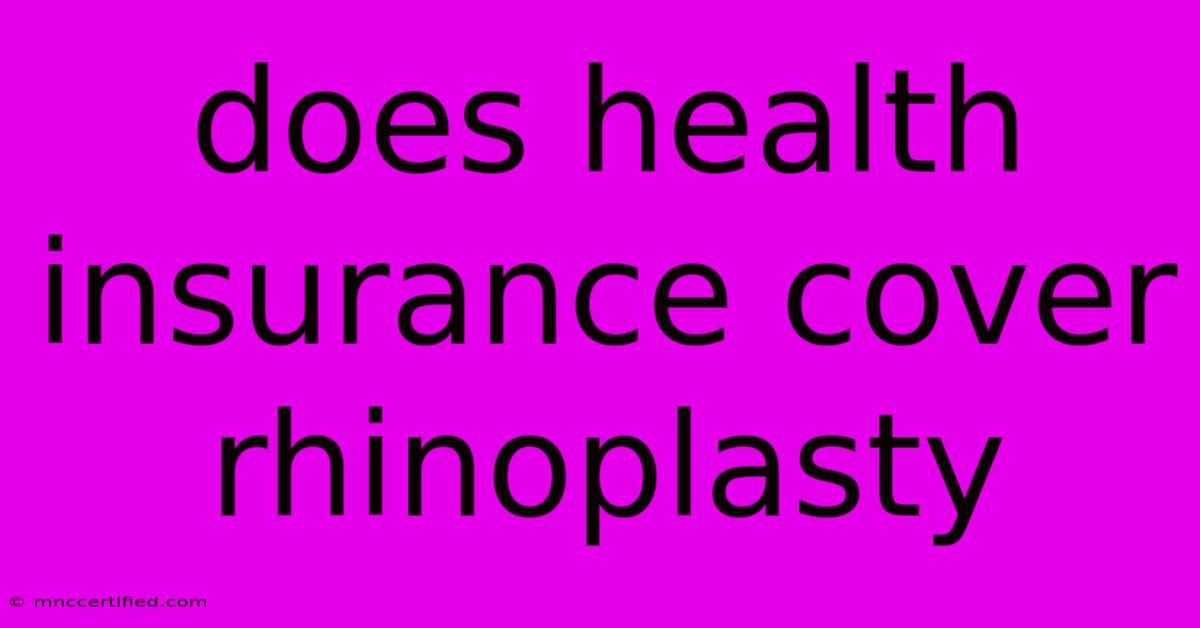Does Health Insurance Cover Rhinoplasty

Table of Contents
Does Health Insurance Cover Rhinoplasty? A Comprehensive Guide
Rhinoplasty, commonly known as a nose job, is a surgical procedure that reshapes the nose to improve its appearance and/or correct breathing problems. While many people dream of a more aesthetically pleasing nose, a common question arises: does health insurance cover rhinoplasty?
The short answer is often no. Health insurance policies typically cover medically necessary procedures, meaning they address health issues that directly impact your well-being. Cosmetic enhancements, even if performed by a qualified surgeon, usually fall outside this scope.
When Rhinoplasty Might Be Covered:
There are a few exceptions where health insurance might cover rhinoplasty:
- Functional Issues: If your nose structure significantly impedes your breathing, causing chronic sinus infections, sleep apnea, or other respiratory problems, your insurance provider might cover the procedure.
- Trauma or Injury: If your nose has been severely injured, requiring reconstructive surgery to restore its function and appearance, insurance is more likely to cover the costs.
- Congenital Deformities: If you have a congenital birth defect affecting your nose, your insurance might cover surgery to correct the issue.
What to Consider:
- Pre-Existing Conditions: If you have a pre-existing medical condition related to your nose, like a deviated septum, your insurance might cover the procedure to correct it.
- Insurance Policy: Carefully review your insurance policy and contact your provider directly to understand your specific coverage and any pre-authorization requirements.
- Cost and Payment Options: If your insurance doesn't cover the procedure, discuss alternative payment options like financing plans or medical loans with your surgeon.
Maximizing Your Chances of Coverage:
- Consult a Qualified Surgeon: A board-certified plastic surgeon or otolaryngologist (ENT) can evaluate your situation and provide medical documentation outlining the functional necessity of the surgery.
- Obtain a Second Opinion: Getting a second opinion from another medical professional can strengthen your case for insurance coverage.
- Focus on Functional Issues: When discussing your concerns with your doctor, prioritize functional issues related to your nose and how they impact your overall health.
Conclusion:
While health insurance rarely covers rhinoplasty solely for cosmetic purposes, there are situations where coverage might be granted due to functional issues or medical necessity. Consulting with a qualified surgeon and understanding your insurance policy thoroughly is crucial to determine the best course of action. Always prioritize your health and consider all options before making a decision.

Thank you for visiting our website wich cover about Does Health Insurance Cover Rhinoplasty. We hope the information provided has been useful to you. Feel free to contact us if you have any questions or need further assistance. See you next time and dont miss to bookmark.
Featured Posts
-
Plan D Investments Proof Of Funds Letter
Nov 08, 2024
-
Is Stretch Therapy Covered By Insurance
Nov 08, 2024
-
Scholz Faces Crisis As Coalition Falls Apart
Nov 08, 2024
-
Insurance Office Of America Longwood Fl
Nov 08, 2024
-
Cosmetic Dentistry Bonding Before After
Nov 08, 2024